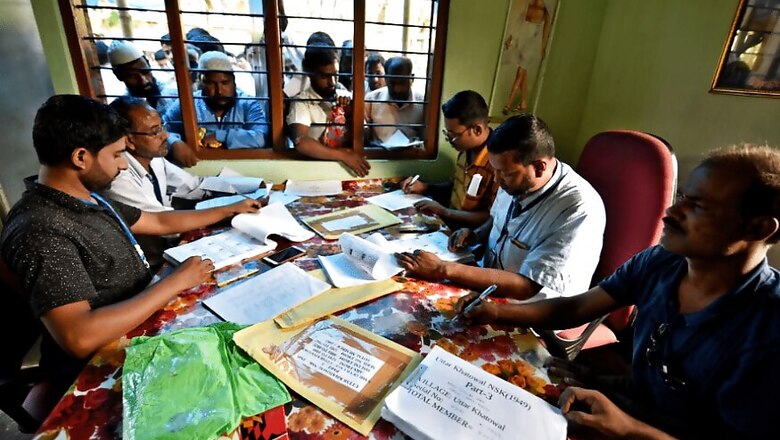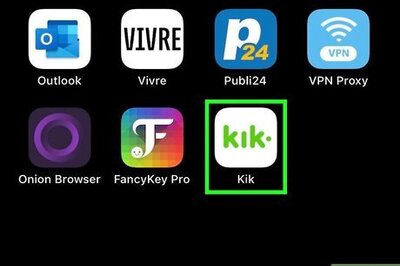
views
New Delhi: In a first, the Supreme Court-monitored National Register of Citizens (NRC) in Assam on Thursday witnessed the arrest of two officials for accepting a bribe from complainant Kajari Ghosh Dutta in Guwahati. They were caught in the act by the Directorate of Vigilance and Anti-corruption.
A team of Assam’s Anti-Corruption Bureau seized the bribe amount of Rs 10,000 from Syed Shahjahan, 48, a Field Level Officer (FLO) of the NRC Seva Kendra in Dispur, Guwahati.
Rahul Parasar, 27, the Assistant Local Registrar of Citizen Registration of the same seva Kendra, was also arrested.
The directorate, in a press note, said, “The accused had highlighted some technical defects in the complainant’s application and demanded the bribe to correct the technical defects and enter her name into the final draft of the NRC.”
While the two accused would be presented before a court later in the day, their arrest has opened the Pandora’s Box of questions regarding the authenticity of this bureaucratic exercise on citizenship.
Speaking to News18, Shajahan Ali Ahmed, general secretary of the Assam-based Association for Protection of Indian Citizenship Rights, alleged that a section of NRC officials were indulging in graft to include applicants in the NRC.
He said such methods of inclusion were “rampant in the ground (meaning rural), but were unheard of in cities”.
“As a process, the NRC is bound to face factual and technical errors. There is a possibility of human error. And the officials take advantage of those who wish to correct those errors in application forms or documentation,” he said.
Shajahan said poor people in Baksa district have to deal with “officials who ask for bribes to furnish panchayat-level identification documents needed for proof of citizenship and to correct errors in the family tree that establish domicile history in Assam”.
Officials were seeking bribes for correction, whereas the law had already provided a recourse by way of appealing in the court, he added.
It is laid down in the NRC process that applicants must submit documents to prove that they or their families lived in India before March 24, 1971.
Prakash Medhi, a District Project Supervisor of the NRC, however, defended the authenticity of process of identification of ‘genuine’ citizens.
He said the gradation of the entire process made it difficult for any one official to mark an applicant as a citizen.
“An applicant files papers with the NRC Seva Kendra, then that application goes to the circle officer. Then those applications are forwarded for verification at the district commissioner level. The application to be granted the citizenship status has to go through scrutiny at many levels,” he said.
Medhi said that even if one paid bribe for to lower-level officials, who usually came in contact with applicants as in the Guwahati case, the application was bound to go through his seniors who would detect the anomalies.
“One person or one office alone in the system cannot decide upon the citizenship of an applicant,” he added.
When the draft NRC was published on July 30, 2018, there was a huge controversy over the exclusion of 40.7 lakh people from it.
The draft NRC included the names of 2.9 crore people out of the total 3.29 crore applications.
The Home Ministry on June 11 mandated the Foreigners' Tribunals in Assam to deliver a verdict in any case related to those whose names could be excluded from the final NRC list within four months.
The over four-year-long process to create a valid list of Indian citizens of Assam via an expansive digital model of the NRC has time and again raised doubts on its final verdict.
News18 spoke to an official at the National Institute of Smart Government (NISG), the agency providing on-ground consultation over application submission and verification in the NRC, to understand the possibility of anomalies in the list.
“Taking a bribe and telling someone that I get you included in the list is not possible. The NRC carries out document-based verification. We have a database of those who have documents and who do not,” said the official, on conditions of anonymity.
The official added that although the transfer, storage and access of an applicant’s data was digital, the process of verification happened manually.
“The NRC Seva Kendras send us manually fed data online because of the lakhs of pages of documentation involved, but they have no right to authenticate it. Records are checked physically, re-checked on servers and then authenticated”.
On whether the NRC authority has a mechanism to address breach of trust by taking a bribe, the official, who is privy to the internal processes, said they were given show-cause notices.
However, when asked if there have been more cases of bribes taken for inclusion, he refused to comment on it.
The NRC authority is set to release its final list of ‘genuine’ Indian citizens of Assam on July 31, 2019.
The Centre is helping the Assam government with setting up of 1,000 Foreigners Tribunals by July 31 to ease the rush of claims for inclusion in the NRC.
The central government is also in the process of giving its approval to the state government’s proposal to set up e-Foreigners Tribunals.


















Comments
0 comment